Teaching
Upcoming Courses (Spring 2025)
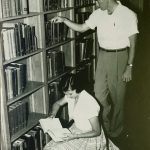 IDS 2935/Quest 1: 1950s Domesticity and UF Life (T 4, R 4-5))
IDS 2935/Quest 1: 1950s Domesticity and UF Life (T 4, R 4-5))
Essential Question: How would your life change if you lived during the American 1950s, and how would that shape your UF experience?
Our interdisciplinary course will explore this question through a lively sampling from literary and popular culture, along with archival material of UF student life in the 1950s. The course draws perspectives from the fields of cultural studies, film studies, gender studies, history, and literary studies. We will consider key cultural dynamics through which domesticity shaped American life, including consumerism, gender roles, the nuclear family, the rise of suburbia, the Civil Rights movement, and the Cold War. Our writers will include John Cheever, Sloan Wilson, Flannery O’Connor, Gwendolyn Brooks, James Baldwin, Allen Ginsberg, Anne Sexton, and Sylvia Plath. We’ll look at 1950s print advertising, classic family sitcoms (Ozzie and Harriet, Father Knows Best, Leave It to Beaver), and the iconic teen rebellion film Rebel Without a Cause. In the University Archives we’ll explore student magazines, yearbooks, and other materials to get a sense of how your UF predecessors experienced our campus in the 1950s. Our course fits the Quest theme Identities by exploring how new understandings of domesticity shaped individual, household, and national identities in postwar America.
Required books: Sloan Wilson, The Man in the Gray Flannel Suit; Sylvia Plath, The Bell Jar
Assignments: short Ad Analysis, medium-length Reflection paper, digital participation, archive Worksheets, group Presentation on University Archive material, a Faux Fifties ad pitched to college students.
 ENG 4936: Desperate Domesticity-The American 1950s (Honors seminar, T 6-8)
ENG 4936: Desperate Domesticity-The American 1950s (Honors seminar, T 6-8)
This course explores fraught constructions of domesticity in American literary and popular culture of the 1950s: including the nuclear family, gender roles, consumerism, the rise of suburbia, the civil rights movement, and alternative domesticities. In addition to a lively range of literature, we’ll explore fifties family sitcoms (Ozzie and Harriet, Father Knows Best, Leave It to Beaver) plus the teen rebellion films Rebel Without a Cause and Blackboard Jungle. Our unit on Campus Life features an archive visit to explore UF student publications from the 1950s. Toward the end, we’ll consider how the American 1950s in plays out in contemporary culture.
Our literary texts will include: Stories of John Cheever, Gwendolyn Brooks’s Maud Martha, James Baldwin’s Notes of a Native Son, Flannery O’Connor’s The Complete Stories, Patricia Highsmith’s The Price of Salt, Robert Lowell’s Life Studies, Sylvia Plath’s The Bell Jar, and Ray Bradbury’s The Martian Chronicles.
Assignments: Archive Worksheet, Class Participation, Digital Participation (Annotations, Discussion Posts), Presentation on 1 of our texts, short paper on a 1950s ad, Seminar Paper & Proposal, Faux Fifties Ad
Current Courses (Fall 2024)
 ENL 3154: Twentieth-Century British Poetry (MWF 4)
ENL 3154: Twentieth-Century British Poetry (MWF 4)
This survey course offers a close look at W.B. Yeats (Selected Poems), Wilfred Owen (Collected Poems), T. S. Eliot, (The Waste Land), W.H. Auden (Selected Poems), *Stevie Smith (Best Poems), Philip Larkin (Collected Poems), Linton Kwesi Johnson (Mi Revalueshanary Fren), Carol Ann Duffy (The World’s Wife), and UF’s own *Michael Hofmann (Selected Poems). We will examine their poems, lives, and cultural contexts. As we move through the syllabus, perceptions of gender, family, and nation will shift as definitions of “British poetry” change. Course assignments are: a long and a short paper, a panel presentation, digital participation (including Perusall annotations), a parody + optional performance, and engaged participation in classroom and digital discussions. Our work together will sharpen your skills in literary analysis, argumentative writing, and creative thinking. I look forward to discussing the poetry with you. (*You’ll need hard copies of these books.)
- Key Archive: LexisUni database (LexisNexis), UF Special Collections (Rare Books)
- Campus Collaborations: Team-taught sessions with Michael Hofmann and Dr. Neil Weijer (Curator of the Harold & Mary Jean Hanson Rare Book Collection)
- Public Outreach: Blog post from 2016 class: Sonnet Ascent!
 LAE 6947: Women’s Writing & Pedagogy (W 6-8)
LAE 6947: Women’s Writing & Pedagogy (W 6-8)
This hybrid seminar-workshop has three aims: (1) to study post-1900 literary texts by women writers from the U.S., Canada, and the U.K. + relevant critical conversations; (2) to brainstorm new pedagogies individually and collaboratively; (3) to further professional development by reading and writing about teaching.Toward these ends, we will read women’s literary writing in diverse forms:
* Tender Buttons, Gertrude Stein * Mrs. Dalloway, Virginia Woolf * Best Poems, Stevie Smith (same text as New Selected Poems) * Maud Martha, Gwendolyn Brooks * Ariel & The Bell Jar, Sylvia Plath * The Bloody Chamber, Angela Carter * Thomas and Beulah, Rita Dove (also in her Selected Poems) * The Penelopiad, Margaret Atwood * Distant Mandate, Ange Mlinko * Fun Home, Alison Bechdel *
We’ll also read journal articles and book chapters about teaching these writers and texts. Through the Mary Sue Koeppel Papers in UF Special Collections, we’ll explore issues of Kalliope (1978-2005), a Florida-affiliated journal that published women’s literature and art. Since this is a seminar-workshop, you’ll do a series of short assignments throughout the semester rather than build toward a long paper. Individually, you will: design 4 Beta assignments for undergraduates, generated from keywords that connect our literary texts (domesticity, city, myth, literary magazine); do 8 digital annotations with Perusall; write a conference paper proposal about pedagogy; craft an assemblage & maker statement; make a draft syllabus. Collaboratively, you’ll co-lead one of our discussions about the Beta assignments. You’ll leave this course with critical contexts + practical strategies for teaching and writing about women’s literature.
Recent Courses
LIT 6856: Desperate Domesticity-The American 1950s (Spring 2024)
This course explores fraught constructions of domesticity in American literary and popular culture of the 1950s: including the nuclear family, gender roles, consumerism, the rise of suburbia, the civil rights movement, and alternative domesticities. In addition to a lively range of literature, we’ll explore fifties family sitcoms (Ozzie and Harriet, Father Knows Best, Leave It to Beaver) plus the teen rebellion films Rebel Without a Cause and Blackboard Jungle. Our unit on Campus Life features an archive visit to explore UF student publications from the 1950s. Toward the end, we’ll consider how the American 1950s in plays out in contemporary culture.
Our literary texts will include: Stories of John Cheever, Gwendolyn Brooks’s Maud Martha, James Baldwin’s Notes of a Native Son, Flannery O’Connor’s The Complete Stories, Patricia Highsmith’s The Price of Salt, Robert Lowell’s Life Studies, Sylvia Plath’s The Bell Jar, and Ray Bradbury’s The Martian Chronicles.
Our assignments: class participation, a presentation on a postwar cultural text, several Perusall annotations, a GenEd assignment keyed to University Archives, a conference paper proposal, and a 16-20 p. seminar paper (MFA option: 8-10 p. conference paper + creative response)
LIT 3031: Studies in Poetry: Modern & Contemporary Women’s Poetry (Fall 2023)
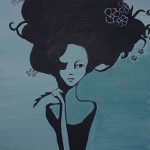 This survey course offers a close look at 8 American poets who launched their careers in the 20th century. We will examine their poems, lives, and cultural contexts as we take on a wide range of styles. As we move through the syllabus, perceptions of domesticity, gender, family, mythology, and poetic language will shift as “women’s poetry” becomes a marketing category and an academic field. We’ll read Edna St. Vincent Millay (Collected Sonnets), Gertrude Stein (Tender Buttons), H.D. (early poems online), Gwendolyn Brooks (Selected Poems), Sylvia Plath (Ariel, Restored edition), Anne Sexton (Selected Poems), Rita Dove (Mother Love), and UF’s own Ange Mlinko (Distant Mandate). As we move across the semester, we’ll see the poets offering confluent and divergent takes on domesticity, form, myth, and relationships. Course assignments will be a short and a long paper, a panel presentation, digital participation (including Perusall annotations), a parody, and engaged participation in class discussions. Our work together will sharpen your skills in literary analysis, argumentative writing, and creative thinking. I look forward to discussing the poetry with you.
This survey course offers a close look at 8 American poets who launched their careers in the 20th century. We will examine their poems, lives, and cultural contexts as we take on a wide range of styles. As we move through the syllabus, perceptions of domesticity, gender, family, mythology, and poetic language will shift as “women’s poetry” becomes a marketing category and an academic field. We’ll read Edna St. Vincent Millay (Collected Sonnets), Gertrude Stein (Tender Buttons), H.D. (early poems online), Gwendolyn Brooks (Selected Poems), Sylvia Plath (Ariel, Restored edition), Anne Sexton (Selected Poems), Rita Dove (Mother Love), and UF’s own Ange Mlinko (Distant Mandate). As we move across the semester, we’ll see the poets offering confluent and divergent takes on domesticity, form, myth, and relationships. Course assignments will be a short and a long paper, a panel presentation, digital participation (including Perusall annotations), a parody, and engaged participation in class discussions. Our work together will sharpen your skills in literary analysis, argumentative writing, and creative thinking. I look forward to discussing the poetry with you.
 AML 4242: Modern American Poetry: Cities (Spring 2023)
AML 4242: Modern American Poetry: Cities (Spring 2023)
This survey course offers a close look at 6 American poets (plus a sampling of others) whose work builds, reflects, and reconstructs cityscapes within and beyond the United States. A continuing influence on American poetry since Walt Whitman, cities have inspired new modes of thinking and making. City poems can be fantastic or realistic, experimental or traditional, dynamic or static, utopic or dystopic. We’ll read poems by Walt Whitman, Edna St. Vincent Millay, William Carlos Williams, T. S. Eliot, Langston Hughes, Gwendolyn Brooks, Allen Ginsberg, Adrienne Rich, Philip Levine, Marge Piercy, Lawrence Joseph, Ange Mlinko, and Harryette Mullen. We’ll also take a look at films by Paul Strand & Charles Sheeler, Man Ray, Helen Levitt, Stan Brakhage, Marie Menken, Radiohead, and Sabine Gruffat. And we’ll read some essays on city poetics, architecture, and spatiality. Course assignments: a brainstorming exercise in collaboration with The Repurpose Project, a short and a longish paper, a panel presentation,6 Perusall Annotations, 2 Discussion Posts, a parody, and engaged participation in class discussions. Our work together will sharpen your skills in literary analysis and argumentative writing as well as tap your creativity. I look forward to discussing the poetry, films, and essays with you.
- Community Collaboration: The Repurpose Project for Personal Trash Pile brainstorming
- Public Outreach: Blog Post (Teaching with Trash)
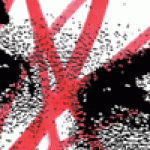 ENG 4936 & ENL 6276: PostPunk Cultures -The British 1980s (Fall 2022)
ENG 4936 & ENL 6276: PostPunk Cultures -The British 1980s (Fall 2022)
This seminar will explore poetry, fiction, film, television, and popular music that emerged alongside major cultural shifts in the U.K. during the 1980s. It was a time of “Iron Lady” Margaret Thatcher, the new social identity “Black British,” and the New Wave. In the wake of Johnny Rotten’s declaration of No Future, Derek Jarman proclaimed The Last of England. The emergent discipline of cultural studies assessed the social meanings of style, and Bloodaxe Books marketed “poetry with an edge.” We will work across artistic and popular media to map key cultural intersections of the British 80s, considering how they are reconfiguring in the wake of Brexit. Our writers include Angela Carter, Julian Barnes, Linton Kwesi Johnson, Carol Ann Duffy, and our UF colleague Michael Hofmann. We’ll read Dick Hebdige’s iconic Subculture: The Meaning of Style plus a selection of essays. We’ll discuss films by Derek Jarman, Stephen Frears, and Neil Jordan, plus episodes of the TV show The Young Ones. And we’ll engage with Gainesville’s annual punk rock festival (The FEST).
Assignments for both seminars include: a class presentation on an 80s singer or band, a short piece about FEST 20, a paper proposal and final paper, 5-7 digital participation assignments, and a DIY craft project using materials from The Repurpose Project. For the graduate class, MFA students can either do the seminar paper or a conference paper + creative response.
- Community Collaborations: FEST 20 and The Repurpose Project
- Campus Collaboration: Team-taught session with Michael Hofmann
- Public Outreach: (from 2022) DIY Body Art project with materials from The Repurpose Project; (from 2016) “inFESTation” collective collage editorial about FEST 15 for Punknews.org, Parts 1 & 2
 AML 4453: Desperate Domesticity, The American 1950s (Spring 2021, online)
AML 4453: Desperate Domesticity, The American 1950s (Spring 2021, online)
This course explores fraught constructions of domesticity in American literary and popular culture of the 1950s, including the nuclear family, gender roles, consumerism, the rise of suburbia, the civil rights movement, and alternative domesticities. Our writers will include John Cheever, Gwendolyn Brooks, Flannery O’Connor, James Baldwin, Ray Bradbury, Patricia Highsmith, Allen Ginsberg, and Sylvia Plath. We’ll explore fifties family sitcoms plus the teen rebellion films Rebel Without a Cause and Blackboard Jungle. We will end with retrospective images of the American 1950s in contemporary culture, considering how the fifties shapes responses to pandemic domesticity in the U.S. Students in both classes will read critical essays about key texts and contexts. Students in the undergraduate class will also read Sloan Wilson’s The Man in the Gray Flannel Suit. Students in the graduate seminar will also read Robert Lowell’s Life Studies and read/view Beatriz Colomina’s Domesticity at War. In addition to a short ad analysis and a longer paper, undergraduate assignments will include a group project with UF Yearbooks from the 1950s.
- Public Outreach: 1950s Yearbook Highlights for UF Libraries Special Collections,
- Blog post on Allen Ginsberg’s supermarket and Perusall (Aisles full of Annotations!)
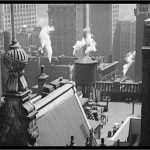 LAE 6947: Modernist Studies & Pedagogy (Spring 2019)
LAE 6947: Modernist Studies & Pedagogy (Spring 2019)
Modernism’s mantra was make it new. This hybrid seminar-workshop will proceed from experience and experiment, drawing on Anglo-American modernist texts, academic essays about teaching, and campus resources to create new pedagogies. Instead of writing a seminar paper, students will do a series of short assignments throughout the semester. We’ll connect with cross-campus colleagues from Architecture, Art History, the Harn Museum of Art, and UF Libraries Special Collections. We’ll lead a pedagogy roundtable for the EGO conference and team-teach a class as an ensemble. In addition, you’ll design Beta Assignments for undergraduate students that respond to these prompts: Manifesto, Cities, Domesticity, University Archives, Love Poems. You’ll leave this course with practical and creative strategies for teaching modernist texts in a variety of contexts.
- Key Archives: University Archives, Harn Museum of Art
- Campus Collaborations: Harn Museum of Art, Professor Rachel Silveri‘s Art History course, School of Architecture
- Public Outreach: Instructional Resources for the Harn Museum of Art
 EMA 1004: Impact of Materials on Society
EMA 1004: Impact of Materials on Society
This team-taught interdisciplinary course draws from faculty in Materials Science and Engineering, Anthropology, Classics, English, History, and Sociology. We look at how materials — such as ceramics, concrete, precious metals, glass, steel, plastics and semiconductors — contributed to the development of technologies and social structures worldwide. We investigate cutting-edge materials and discuss their future impact on medicine, transportation, clean energy, sports, and more. We learn how cultural variables like gender, race, power/authority, religious beliefs, and politics shape the development of materials. From ancient cities and Roman baths, steel foundries and Tupperware parties, to virtual communities and nanomedicine, we examine case studies from the past to imagine the future social impacts of new materials. This course has been funded by UF, Materials Research Society, and The National Science Foundation.
- Campus Collaboration: Interdisciplinary team coordinated through UF’s Center for the Humanities and the Public Sphere
- Public Outreach: Collaborative textbook, educational videos (see Gallery for Polymers video); piece for The Conversation; Wisconsin Public Radio interview
 AML 4242: Modern American Poetry & Design (Spring 2018)
AML 4242: Modern American Poetry & Design (Spring 2018)
This course has two key components: (1) a medley of poems by Robert Frost, Gertrude Stein, T. S. Eliot, Wallace Stevens, William Carlos Williams, Langston Hughes, Gwendolyn Brooks, and Allen Ginsberg; (2) collaborations with Professor C. Hailey’s & D. Cohen’s Design Studio students in UF’s School of Architecture. We’ll consider the poets’ lives and cultural contexts, the aesthetics of city poems, the creative process, repurposing, and maker spaces. We’ll each make a trip to The Repurpose Project to see the Design Studio students build their Maker Space. And we’ll read some work on design and spatiality. (Image by Lissandra Hadron Dyer.)
- Key Archives: Materials at The Repurpose Project
- Campus Collaborations: Linked assignments with Professor Charlie Hailey’s Design/Build class (School of Architecture)
- Public Outreach: Thirteen Tactics for Teaching Poetry as Architecture
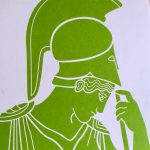 LIT 3383: Women Writers and Classical Myths (Spring 2015)
LIT 3383: Women Writers and Classical Myths (Spring 2015)
Team-taught with Mary Ann Eaverly (UF Classics), this course challenges students to examine women and Classical myth through ancient and modern materials: including poetry, literary criticism, art, and film. We give equal weight to our respective academic fields and their connectivity, focusing on legendary characters such as Athena, Pandora, Helen, and Penelope. By linking Hesiod and Homer with former U.S. Poet Laureate Rita Dove and contemporary novelist Margaret Atwood, we learn how the Classical tradition challenges and sustains women writers. Because this rich source material is visual as well as literary, we will include materials from UF’s Harn Museum of Art through our custom gallery for this course, Classical Convergences: Traditions and Inventions. Texts will include Homer’s epic poems, Atwood’s The Penelopiad, Dove’s Mother Love, Powell’s Classical Myth, and the NBC miniseries The Odyssey, and our UF colleague Ange Mlinko’s Marvelous Things Overheard. This course was sponsored by UF’s Honors College and Center for the Humanities and the Public Sphere.
- Campus Collaborations: UF Classics, Harn Museum of Art
- Public Outreach: Classical Convergences exhibit at the Harn Museum (see Gallery)
 AML 4311: Sylvia Plath & Her Cultural Afterlife (Fall 2013)
AML 4311: Sylvia Plath & Her Cultural Afterlife (Fall 2013)
By the time she was named one of Time magazine’s 100 Artists and Entertainers of the Century in 1998, Sylvia Plath had become a preeminent poet—and literary culture’s ultimate commodity. From her photo-shoot in the Cambridge Varsity during her Fulbright years to Christine Jeffs’s film Sylvia, Plath enters the cultural imagination as text and image, writer and celebrity, historical and mythic figure. This course will explore Plath’s literary career and her cultural afterlife through close study of her poems, her novel and short stories, her journals, and her critical reception on the web (including the online journal Plath Profiles). We will also study key ways that biographers plot Plath’s life and career, as well as her contemporary status in the media. The latter perspective is especially fitting in this 50th anniversary of The Bell Jar and Plath’s death. Our work together will sharpen your skills in literary, critical, and cultural analysis, as well as hone your abilities to write and speak professionally.
- Key Archives: Plath biographies, LexisNexis Academic, Sylvia Plath Info Blog
- Public Outreach: Plath Profiles publication on parodies featuring student work
IMAGE Credits:
House Beautiful, “Kitchens of the 1950s” (2008).
Still from Manhatta (1921), by Paul Strand and Charles Sheeler.
Lissandra Dyer, Repurposing Slide with Door Hinge (detail). 2018.
Close-up of DVD case for Derek Jarman’s Jubilee (1978).
Design inspired by marble relief of The Pensive Athena, Acropolis Museum Store.
Impact of Materials on Society (IMOS) logo.
